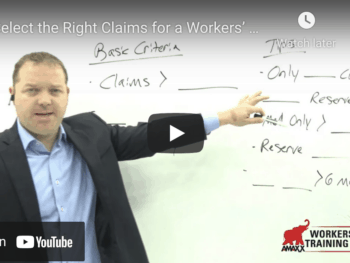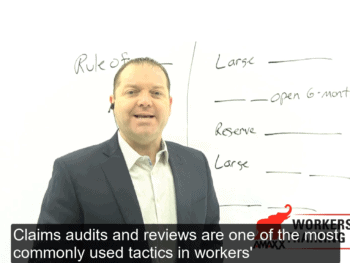Few things will frazzle a team of adjusters more than knowing that an audit is approaching. This is where everything is reviewed on a file —either internally from the same company or externally from an outside third party. Auditors will look at best practice guidelines, depth of investigation, thoroughness of file, medical records, reserves, and anything else that pertains to the overall file. Some audits will also include the work from the supervisor, so the auditor can see the relation and involvement between the adjusters and their supervisor.
Audits are a good thing. This is where adjusters/supervisors are able to see how well they are performing. It is one thing to deem a claim compensable—you have to arrive at that proper conclusion by following the normal guidelines of best practices. These include timely contacts, depth of investigation, securing of medical records, review of the evidence, and compensability decision.
So if you have an audit coming, keep the following in mind:
-
Clean up the file by labeling items, either on old paper files or by labeling your electronic medical records
A sure way to fail an audit is if the auditor cannot locate the paperwork they need to review the file. If you have a lot of old lifetime files in some box somewhere, you are going to have to bite the bullet and dive in. I know this is really a pain, but you have to organize the file. Not only will it help the person performing the audit, but it will help you since you have to catch the file up and go through all those records.
-
Include the most recent medical records and a summary of the prescriptions that you have paid for over the last 12-16 months
If you have a lot of older files, you know a few of these are going to be picked to be audited. Some of these old files rarely get updated by the adjuster more than once or twice a year. If you have the file on your diary to be checked every 6 months, do you know if you are paying monthly prescription refills? Are these medications coming from the treating physician on the file? Are there new medications you are paying for and are they related to the injury? Are there new pain complaints or anything that is unrelated for treatment that you may be paying for? The adjuster had better know the answer to these questions, or else you may be in for a rough audit grade.
-
Review the reserves, are they current?
One of the main reasons for audits is to check the accuracy of the reserving on the file. In order to ascertain if your reserves are accurate, you have to delve into the file again to check it out. Has anything changed over the past 12 months? Could a surgery be pending or possible in the near future? This is a good time to check out the bills that you may have set for autopayment, which I really dislike. It is like a necessary evil. I understand why it is there, and why most carriers have to do this on their lifetime claims, but the leakage that results due to medical bills and prescriptions paid in error drives me crazy.
Now is a good time to review your settings, to make sure they are accurate and pertain to the body parts you have set up in your billing autopay feature should you have one. If not, you know that the auditor is going to look and investigate it.
-
Do an alive/well check if you have not talked to the employee in over a year
Sticking with the lifetime claim theme, are you sure your claimant is still alive? As crazy as this may sound, we have all heard of payments continuing on a deceased claimant where their relatives continue to receive their comp checks. Not only does this make the adjuster look awful, but it is also illegal. So if you have not talked to your claimant in a while, schedule your SIU vendor to perform an in-person alive and well check.
-
Review your notes in the file to make sure you covered all of your bases on coverage
Even worse than continuing to pay a deceased claimant is to continue to pay a claim where there was no coverage to begin with. For those adjusters who work for an insurance carrier, is this employee covered under the policy or exempt? Is the insured location covered under the stated policy, or a different one? If this was a transferred file to your handling, were there any compensability issues that arose early on in the file? Should benefits continue to be paid or do you need to reassess the overall compensability on the file? Were all the past medical records obtained? Did an IME address all of your concerns on the file?
With current caseloads larger than ever, it is easy to have one sneak through the cracks. This is a good time to take a step back and objectively look at the file from the start to be sure it is correctly being paid with proper coverage for this employee under the stated policy.
Summary
Per usual, these items are only a snapshot of the larger picture that a claim audit will conduct. The point of these audits is to be sure that claims are being handled correctly within the best practices outlined by your company. Audit season comes around as a reminder that adjusters need to be objective on all of their claims, no matter how long a claim has been around.
Author Michael B. Stack, CPA, Director of Operations, Amaxx Risk Solutions, Inc. is an expert in employer communication systems and part of the Amaxx team helping companies reduce their workers compensation costs by 20% to 50%. He is a writer, speaker, and website publisher. www.reduceyourworkerscomp.com. Contact: mstack@reduceyourworkerscomp.com.
©2013 Amaxx Risk Solutions, Inc. All rights reserved under International Copyright Law.













